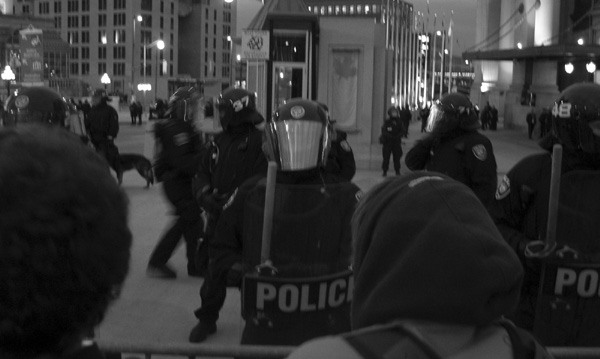Friday, March 21, 2008
Remember the Arar Commission?
There was much discussion and fanfare yesterday, as the government announced the creation of a new council to oversee the restructuring of the RCMP.
The RCMP Reform Implementation Council has been created to follow up on and implement the recommendations made by the Task Force on Governance and Cultural Change in the RCMP. Some months back, I did a three-part blog on RCMP reform, comparing the Task Force report to the recommendations made by the Arar Commission of Inquiry. You can see part 1 of the series here, part 2 here, and part 3 (the comparative analysis and discussion) here. In particular, I compared the two models of oversight put forward by the two reports. In my conclusion, I noted that the model put forward by the Task Force fails to address the problems that RCMP national security activities (and other forms of collaborative or integrated policing) pose for governance and oversight. In short, the Task Force report seems to have ignored the lessons learned from the Arar Inquiry (or rather, conveniently ignores that the whole Arar Affair took place at all).
We are now at the implementation stage, and it is clear that the government has opted to follow the Task Force report as a guideline for the restructuring of the RCMP (see, for example, the Council's terms of reference). You can look at the bios of the Council members (as provided by Public Safety Canada) here. The RCMP has announced that it welcomes the creation of the new Council, and that an internal Change Management Team has been established to work with the Council on restructuring.
I am not entirely critical of the Task Force report, and some of the recommended changes which will be implemented in the coming months have merit. But, the report is a management document, written by managers and bureaucrats, and its goal is to improve the "organizational excellence" of the RCMP as a corporation. The O'Connor Report, following from the Arar Inquiry, is based on a different set of objectives, and it follows from one of the most serious and consequential episodes in the history of the force. If RCMP reform is not to take place along the lines recommended by O'Connor, at the very least his remarks about the review of RCMP national security activities must be taken into consideration.
Major structural changes to the RCMP do not occur often, and it is unlikely that we will see another window of opportunity for the substantive enhancement of the organization's accountability, review, and oversight mechanisms in the near future. So, if the recommendations of the O'Connor Commission on this matter are to have any teeth at all, the time for them to be taken up is now. The very idea that, less than two years after the filing of the final report in the Arar Inquiry, RCMP reform could go forward with no formal reference to the Arar Affair is troubling, to say the least. That such a reform plan could be announced without the media asking any questions related to Arar or the Commission is baffling. Sure enough, though, the CBC, The Globe and Mail, and CTV all allowed their reporting on the story to be framed by the government's own remarks (which omit any mention of Arar). The critical commentary that I have seen from the Canadian media deals with whether and to what extent the new Council will follow all of the recommendations of the Task Force, and about the composition of the Council itself.
The Task Force report, Rebuilding the Trust, makes only one mention of the Arar Affair. On page vii, in the introduction, the report notes that
"At the time of our appointment and throughout the term of our mandate, the RCMP was under intense public scrutiny. In addition to the Investigative Report, Justice O'Connor had recently released his report on the Arar affair and made very significant recommendations."
That's it.
My concern is that, for political reasons, specific references to the O'Connor Report, and through it, to the Arar Affair, will be conspicuously absent from the publications of the RCMP Reform Implementation Council, its internal RCMP counterpart, and other parties involved in this restructuring effort. And, consequently, it will be very difficult for us as citizens to evaluate the end product of the process in light of the concerns raised by Commissioner O'Connor.
I will be following the progress of the Council, and writing about the RCMP restructuring process as it unfolds.
All the best,
- Mike
Posted by Mike Larsen at 3:02 PM
Labels: Policing, RCMP review and oversight
Subscribe to:
Post Comments (Atom)

No comments:
Post a Comment